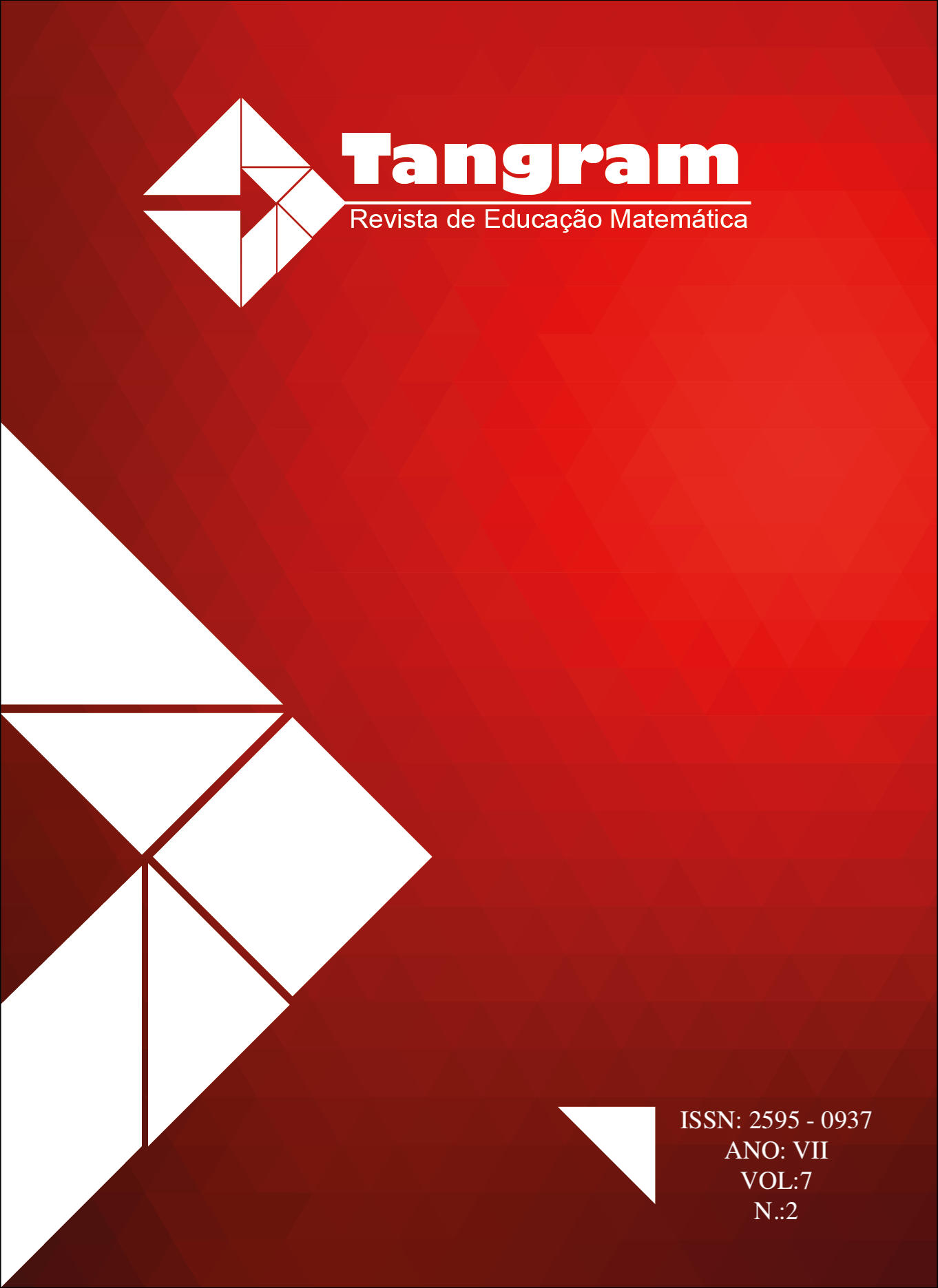Potentialities involved in an investigative activity on Plane and Spatial Geometries using GeoGebra 3D
DOI:
https://doi.org/10.30612/tangram.v7i2.17598Keywords:
GeoGebra 3D, Geometry, Three Worlds of MathematicsAbstract
In this article we evaluate potentialities involved in an investigative activity on Plane and Spatial Geometries using GeoGebra 3D. For this, we held an online workshop on the use of this application for 17 Mathematics graduates from a public educational institution, followed by the application of the investigative activity. For the analysis of the activity, we selected one of the participants, whose resolution was recorded. The Three Worlds of Mathematics is the theoretical framework that supports our analyses. The results indicate the potential of the proposed activity and the use of GeoGebra 3D in the processes of elaboration of definitions, conjectures and justifications in the teaching of plane and spatial geometries.
Downloads
References
Brasil. Ministério da Educação. (2018). Base Nacional Comum Curricular. Brasília. Recuperado em 29 de novembro, 2023, de http://basenacionalcomum.mec.gov.br/images/BNCC_EI_EF_110518_versaofinal_site.
Guimarães, R. C. C.; Vieira, W.; Imafuku, R. S.; Pereira, E. F. M. (2021). Uso do smartphone na investigação sobre propriedades de quadriláteros notáveis. Revista Iberoamericana de Educación Matemática, 61, 1-20. https://www.revistaunion.org/index.php/UNION/article/view/226
Lecrer, O. P. V. G.; Pazuch, V. (2020). O ensino de Geometria Espacial: um panorama de pesquisas por meio de uma metassíntese. Revista Paranaense de Educação Matemática, 9 (20), 38-61. https://periodicos.unespar.edu.br/index.php/rpem/article/view/6258
Leme, C. B. (2017). O Uso do GeoGebra no Ensino da Geometria Espacial para Alunos do 2º Ano do Ensino Médio. Dissertação (Mestrado Profissional em Matemática), Universidade Estadual de Ponta Grossa. https://tede2.uepg.br/jspui/bitstream/prefix/2429/1/Claudio%20Leme.pdf
Macedo, I. S. (2013). Facilitando o Estudo da Geometria Espacial com o GeoGebra 3D. Dissertação (Mestrado Profissional em Matemática), Universidade Federal da Bahia. https://repositorio.ufba.br/handle/ri/22977
Silva, M. D. F.; Lyra, A. B. (2020). O Uso do GeoGebra em Atividades Matemáticas na Formação Docente. Revista de Educação, Ciências e Matemática, 10 (2), 18-34. https://publicacoes.unigranrio.edu.br/index.php/recm/article/view/5012/0
Sousa, R. C. de; Alves, F. R. V.; Fontenele, F. C. F. (2020). Aspectos da Teoria das Situações Didáticas (TSD) Aplicada ao Ensino de Geometria Espacial Referente às Questões do ENEM com Amparo do Software GeoGebra. ALEXANDRIA: Revista de Educação, Ciência e Tecnologia, 13 (2), 123-142. https://periodicos.ufsc.br/index.php/alexandria/article/view/65363
Souza, V. H. G.; Bonomi, M. C.; Vieira, W.; Imafuku, R.S. (2020). Cônicas com dobraduras e GeoGebra: uma possível abordagem para a educação básica. Revista Iberoamericana de Educación Matemática, 59, 83-101. https://www.revistaunion.org/index.php/UNION/article/view/128
Tall, D. O. (2013). How humans learn to think mathematically: exploring the Three Worlds of Mathematics (1st Edition ed.). Cambridge, England: Cambridge University Press.
Downloads
Published
How to Cite
Issue
Section
License

This work is licensed under a Creative Commons Attribution-NonCommercial-ShareAlike 3.0 Unported License.
Authors must accept the publication rules when submitting the journal, as well as agree to the following terms:
(a) The Editorial Board reserves the right to make changes to the Portuguese language in the originals to maintain the cultured standard of the language, while respecting the style of the authors.
(b) Authors retain the copyright and grant the journal the right to first publication, with the work simultaneously licensed under the Attribution-NonCommercial-ShareAlike 3.0 Brazil (CC BY-NC-SA 3.0 BR) that allows: Share - copy and redistribute the material in any medium or format and Adapt - remix, transform, and create from the material. CC BY-NC-SA 3.0 BR considers the following terms:
- Attribution - You must give the appropriate credit, provide a link to the license and indicate whether changes have been made. You must do so under any reasonable circumstances, but in no way that would suggest that the licensor supports you or your use.
- NonCommercial - You may not use the material for commercial purposes.
- Sharing - If you remix, transform, or create from material, you must distribute your contributions under the same license as the original.
- No additional restrictions - You may not apply legal terms or technological measures that legally restrict others from doing anything that the license permits.
(c) After publication, authors are allowed and encouraged to publish and distribute their work online - in institutional repositories, personal page, social network or other scientific dissemination sites, as long as the publication is not for commercial purposes.








